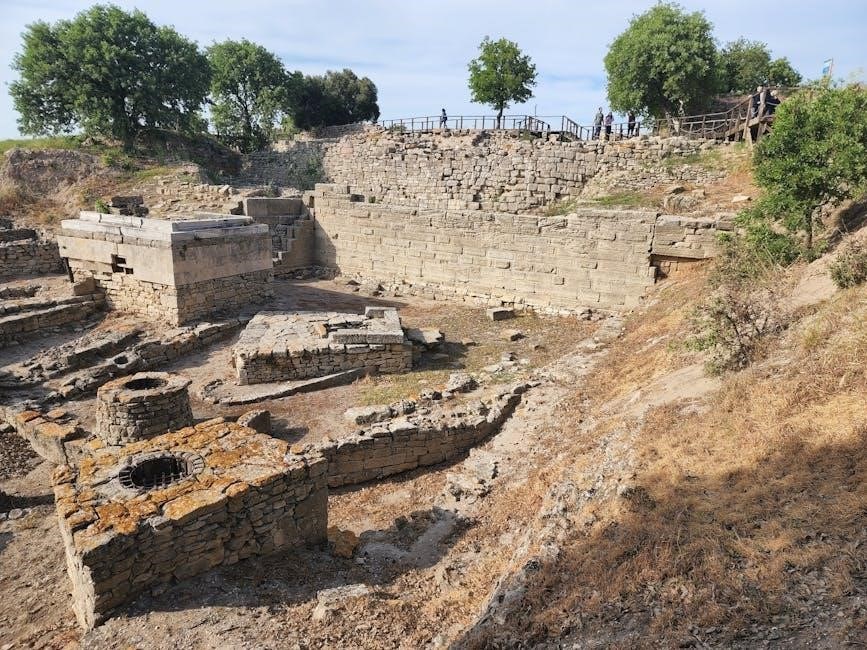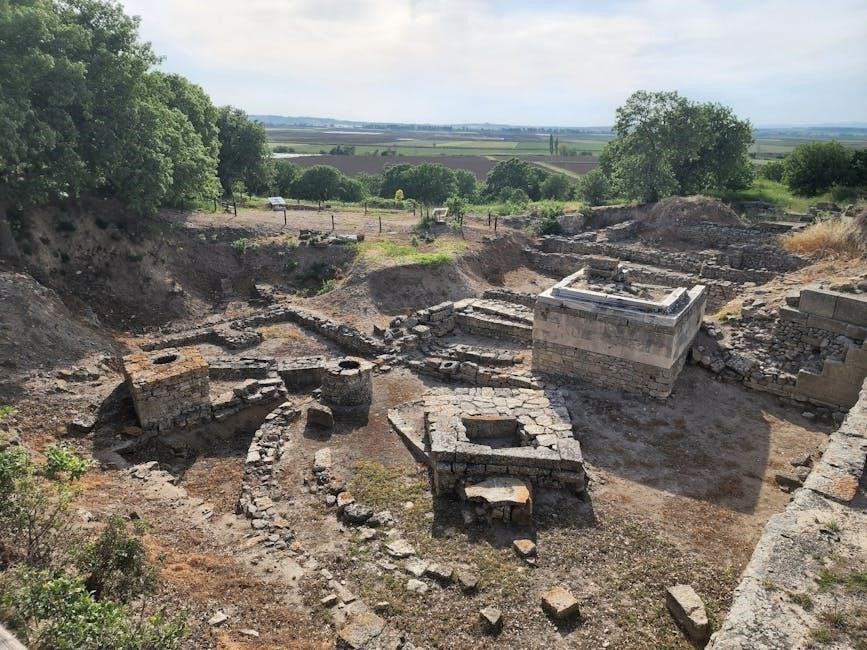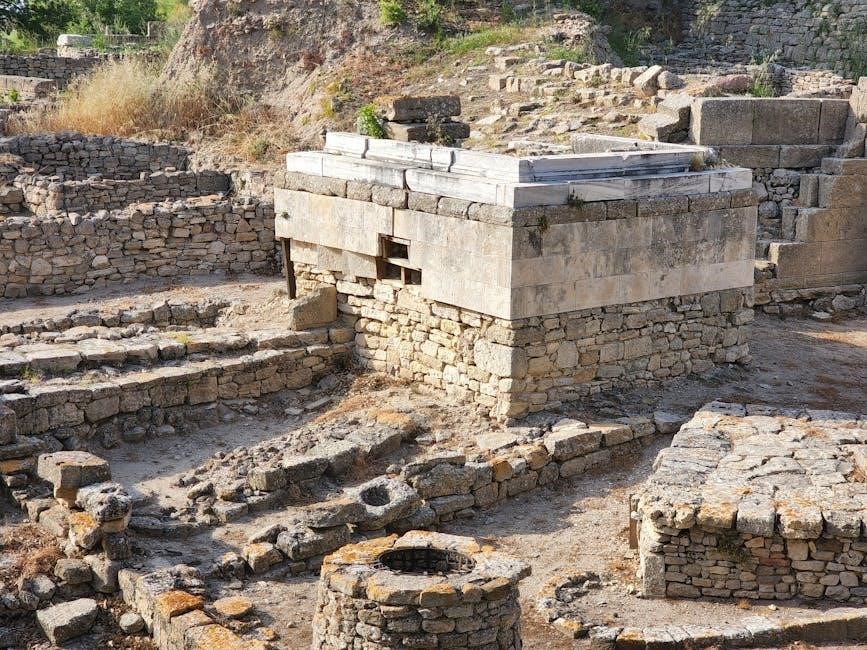Robert Fagles’ masterful translation of Homer’s Iliad brings the epic tale of the Trojan War to life, capturing the rage of Achilles and the human cost of conflict․ With an insightful introduction by Bernard Knox, this version bridges ancient and modern storytelling, offering a profound exploration of honor, pride, and mortality․ Available in PDF, it remains a timeless classic for scholars and readers alike․
Overview of Homer’s Epic Poem
Homer’s Iliad is an ancient Greek epic poem that chronicles the final year of the Trojan War, a ten-year conflict between the city of Troy and the Greeks․ Attributed to the legendary poet Homer, the work is a cornerstone of classical literature, exploring themes of honor, pride, and mortality․ Comprising 24 books written in dactylic hexameter, the poem centers on the wrath of Achilles, a Greek warrior, and its devastating consequences․ The narrative unfolds with dramatic battles, divine interventions, and poignant human struggles, offering a rich tapestry of heroism and tragedy․ Believed to have been composed in the late eighth or early seventh century BCE, the Iliad remains a timeless masterpiece, shaping Western literary tradition․ Its enduring appeal has led to numerous translations, including Robert Fagles’ acclaimed version, which is widely available in PDF format for modern readers․
Themes and Historical Context
The Iliad delves into profound themes such as honor, pride, and the human condition, set against the backdrop of the Trojan War․ This epic poem explores the complexities of heroism through characters like Achilles and Hector, while examining the role of fate and divine intervention․ Historically, the Iliad is believed to reflect the cultural values of ancient Greece, emphasizing the importance of glory and loyalty․ The poem’s composition, attributed to Homer in the late eighth or early seventh century BCE, is rooted in oral tradition․ Its historical context is enriched by the vivid portrayal of battles and societal norms of the time․ Robert Fagles’ translation captures these elements, making the Iliad accessible to modern readers while preserving its ancient essence․ The PDF version of Fagles’ work ensures that this timeless epic remains a vital part of literary heritage․

Robert Fagles and His Contribution
Robert Fagles, a distinguished scholar and translator, brought Homer’s Iliad to modern readers with his acclaimed translations, available in PDF, ensuring timeless accessibility and academic rigor․
Background and Achievements of Robert Fagles
Robert Fagles, a renowned classicist and translator, held the position of Arthur W․ Marks ’19 Professor of Comparative Literature at Princeton University․ His work as an associate editor on Maynard Mack’s Twickenham Edition of Alexander Pope’s Iliad and Odyssey showcased his scholarly expertise․ Fagles is celebrated for his translations of ancient Greek literature, including Homer’s Iliad and Odyssey, which are widely praised for their lyrical precision and accessibility․ His achievements were recognized with the 1997 PEN/Ralph Manheim Medal for Translation and a 1996 Academy Award․ Fagles’ translations, available in PDF formats, continue to be essential resources for both academic and general audiences, ensuring the enduring legacy of classical literature․
Significance of Fagles’ Translation
Robert Fagles’ translation of the Iliad is celebrated for its ability to bridge the gap between ancient Greek poetry and modern English, making Homer’s epic accessible to a broad audience․ His use of contemporary language retains the original’s emotional depth and poetic grandeur while avoiding archaic phrasing․ The introduction by Bernard Knox provides crucial context, aiding readers in understanding the historical and cultural significance of the text․ Fagles’ work is praised for its fidelity to Homer’s intent, balanced with a fluid, readable style․ This translation has been widely acclaimed, earning Fagles numerous awards and solidifying his reputation as a master translator․ The PDF version of his Iliad remains a popular choice for scholars and general readers, ensuring the timeless story of Achilles’ rage continues to resonate with modern audiences․

Accessing the Iliad in PDF Format
The Iliad in Robert Fagles’ translation is widely available in PDF format, accessible for purchase online or borrowed from libraries and free digital archives․
Purchasing the PDF Version
Purchasing the PDF version of Robert Fagles’ Iliad offers a convenient and high-quality reading experience․ Online retailers like Amazon and Barnes & Noble provide digital copies that can be downloaded immediately․ This version is part of the Penguin Classics Deluxe Edition, ensuring a well-formatted and readable file․ The PDF is compatible with various e-readers, including Kindle and Kobo, making it easy to access on multiple devices․ Buying directly from publishers or authorized sellers guarantees authenticity and supports the creators․ Additionally, purchasing the PDF allows for offline access, enabling readers to immerse themselves in the epic tale without interruptions․ This option is ideal for those who value a seamless and enduring reading experience of this timeless classic․
Borrowing from Libraries or Free Resources
Accessing Robert Fagles’ Iliad in PDF format can also be done through libraries or free resources․ Many public and academic libraries offer free e-book lending services, including classic works like the Iliad․ Platforms like OverDrive or Libby often carry Fagles’ translation, allowing borrowers to download the PDF for a limited period․ Additionally, websites such as Project Gutenberg or the Internet Archive provide free access to public domain works, though Fagles’ translation may not be available there due to copyright․ Some libraries may also offer interlibrary loan services, enabling patrons to request digital copies․ For those who prefer free access, certain online repositories or educational sites may host the PDF, though availability can vary; Borrowing is a cost-effective way to explore this epic poem while supporting public access to literature․

Features of Fagles’ Translation
Robert Fagles’ translation of the Iliad is celebrated for its modern, accessible style while maintaining the epic’s original grandeur․ His work includes an introduction by Bernard Knox, offering historical context and insights, making the ancient tale relatable to contemporary readers․ Fagles’ prose balances poetic elegance with readability, capturing the emotional depth and complexity of Homer’s original text․ This translation has become a benchmark for its fidelity to the source material while engaging modern audiences effectively․
Bernard Knox’s introduction to Robert Fagles’ translation of the Iliad provides a rich contextual framework for understanding Homer’s epic poem․ A renowned classicist, Knox offers insights into the historical and cultural background of the Iliad, exploring its themes of honor, pride, and mortality․ His analysis delves into the complexities of the characters, particularly Achilles, and the broader implications of the Trojan War․ Knox also examines the poetic structure and the enduring relevance of the Iliad in modern times․ His introduction is both scholarly and accessible, making it an invaluable resource for readers seeking to deepen their appreciation of the text․ Knox’s contributions enhance the reader’s ability to engage with Fagles’ translation, bridging the gap between ancient and contemporary audiences․
Modern Translation Style and Accessibility
Robert Fagles’ translation of the Iliad is celebrated for its modern style and accessibility, making Homer’s ancient epic resonate with contemporary readers․ Fagles employs a clear and fluid prose, balancing poetic elegance with readability․ His use of free verse captures the original’s dramatic intensity without adhering strictly to meter, ensuring the story’s emotional depth and action remain vivid․ This approach has made the Iliad accessible to a broad audience, including those unfamiliar with classical Greek literature․ The PDF version of Fagles’ translation maintains this clarity, offering a seamless reading experience․ His modern style preserves the epic’s timeless themes, such as human conflict and divine intervention, ensuring the Iliad remains a relevant and compelling read in the digital age․

Comparisons with Other Translations
Fagles’ translation stands out for its poetic yet accessible language, differing from versions by Caroline Alexander or Richmond Lattimore․ His modern style emphasizes storytelling clarity, making the Iliad relatable while preserving its epic grandeur․
Similarities and Differences with Other Versions
Robert Fagles’ translation of the Iliad shares similarities with other versions in its commitment to preserving Homer’s epic narrative and poetic essence․ However, it differs significantly in its modern, accessible language, which sets it apart from more literal translations like Richmond Lattimore’s․ Fagles’ focus on readability and emotional resonance aligns with Caroline Alexander’s approach, yet his poetic diction and rhythm are uniquely evocative․ While other translations may prioritize scholarly accuracy, Fagles balances fidelity with a contemporary voice, making the ancient text relatable․ The inclusion of Bernard Knox’s introduction further enhances its appeal, offering contextual depth that enriches the reader’s understanding․ Overall, Fagles’ interpretation stands as a bridge between tradition and modernity, ensuring the Iliad’s timeless themes remain accessible to a broad audience․
Unique Aspects of Fagles’ Interpretation
Robert Fagles’ translation of the Iliad is distinguished by its poetic yet accessible language, which captures the epic’s grandeur while remaining deeply human․ Unlike more literal translations, Fagles employs a fluid, modern style that preserves the original’s emotional intensity․ His use of blank verse, rather than rhyme, allows for a natural rhythm that mirrors the Greek text’s cadence․ Fagles also emphasizes the psychological complexity of characters like Achilles, making their struggles and emotions resonate with contemporary readers․ Additionally, his interpretation is enriched by Bernard Knox’s insightful introduction, which provides historical and cultural context․ Fagles’ ability to balance fidelity to Homer’s vision with a fresh, engaging voice ensures that the Iliad remains a vivid and relatable masterpiece for modern audiences․